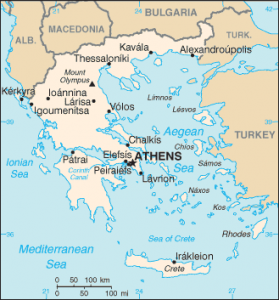The Greek Centers for Disease Control, or KEELPNO announced the first human case of West Nile virus (WNV) in a resident of the region of Eastern Attica in 2014 (computer translated).

Image/CIA
The patient, a 85-year-old resident is now hospitalized for treatment. The patient had no history of international travel.
Health officials say surveillance data in animals since the beginning of summer 2014 have shown the virus circulation in Central Macedonia. This first human case was diagnosed relatively late in this season of transmission (32 weeks).
KEELPO notes that epidemiological surveillance, systematic and timely program of mosquito control and public awareness for protection from mosquitoes, are the most important measures for preventing the disease.
West Nile virus is a mosquito-borne disease that can cause encephalitis, a brain inflammation. West Nile virus was first detected in North America in 1999 in New York. Prior to that it had only been found in Africa, Eastern Europe, and West Asia.
According to the US Centers for Disease Control and Prevention (CDC), approximately 80 percent of people (about 4 out of 5) who are infected with WNV will not show any symptoms at all.
Up to 20 percent of the people who become infected have symptoms such as fever, headache, and body aches, nausea, vomiting, and sometimes swollen lymph glands or a skin rash on the chest, stomach and back. Symptoms can last for as short as a few days, though even healthy people have become sick for several weeks.
About one in 150 people infected with WNV will develop severe illness. The severe symptoms can include high fever, headache, neck stiffness, stupor, disorientation, coma, tremors, convulsions, muscle weakness, vision loss, numbness and paralysis. These symptoms may last several weeks, and neurological effects may be permanent.
There is no specific treatment for WNV infection. For more infectious disease news and information, visit and “like” the Infectious Disease News Facebook page

